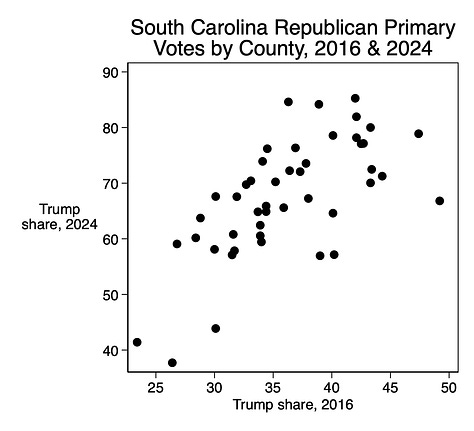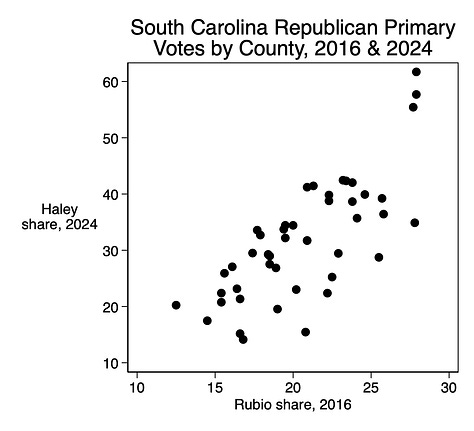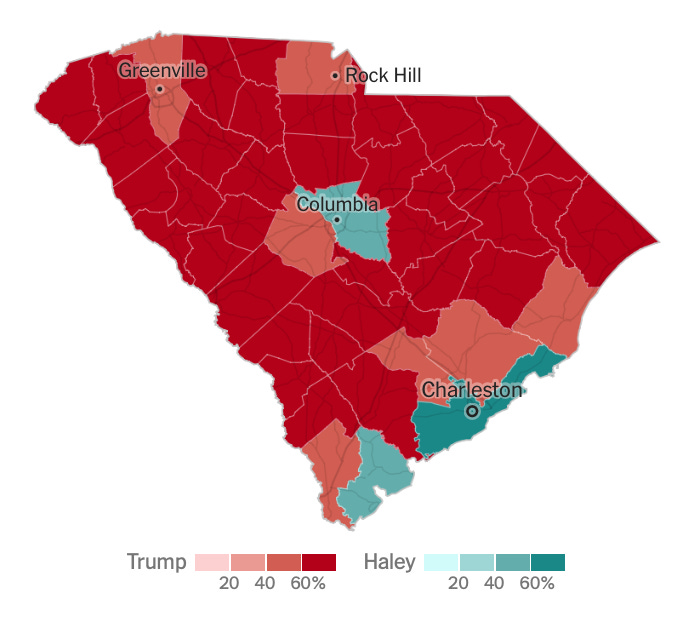South Carolina primary reflections
Trump is not winning like an "incumbent" should be, but he's still winning
Okay, another primary, another Trump victory. Yes, he’s still overwhelmingly likely to be the party’s presidential nominee. But there were a few notable aspects of this contests that should inform how we’re thinking about this contest going forward.
Nikki Haley surpassed her polling (again) and pulled ~40% against the head of her party (again). This is not a small thing. Polling averages heading into South Carolina had Haley at 34%; she surpassed that by 5-6 points. She similarly surpassed polling averages in New Hampshire. Those two contests, in particular, allow for independent voters to participate in Republican primaries, and there’s not a whole lot of action on the Democratic side right now. That’s clearly helping her, even if it’s not pushing her over 50%. Also, as I noted previously, it’s kind of a big deal if the head of the party, running effectively as the incumbent, has someone pulling 40% of the vote from him. Yeah, the overwhelming bulk of that 40% will almost certainly end up backing him in November, but this is the kind of party division that is usually considered a serious warning to the frontrunner. Side note: Over at FiveThirtyEight, Julia Azari reports that Nikki Haley has now become the first woman in history to win more than one delegate in a Republican presidential nomination cycle.
Electability is not the slam-dunk argument Haley wants. In her appeals to South Carolina voters, one of the main arguments Haley has made is that she can beat Biden by substantial margins and Trump can’t. It’s backed up by plenty of polling data, but, as I’ve written in several places, only gets her so far with Republican voters. One thing blunting this argument is that Trump is ahead of Biden in many national polls, if only marginally, suggesting to Trump supporters that they’re not really risking anything by backing him. Another is that Republicans have long been less obsessed with electability than Democrats have, and with good reason. Trump was repeatedly depicted as unelectable in 2016 and won anyway. A third problem is that Republicans know that if, by some miracle, Haley managed to win the Republican nomination, Trump would spend the rest of the year accusing her campaign and the RNC of fraud, crapping all over her candidacy, and quite possibly launching a third party bid, splitting the Republican vote. Suddenly the more electable candidate wouldn’t be looking so electable.
The pace of contests over the past month has been a bit slow, but it’s about to increase rapidly. We’ve got primaries in Michigan and Idaho next weekend, followed a few days later by Super Tuesday, which features more than a dozen state and territorial primaries and caucuses. Could Haley actually win any of those? I’ll admit the math doesn’t look great for her, but one place I’d keep an eye on is my state of Colorado. It has an open primary and a highly college-educated electorate, and, on top of that, there’s legitimate confusion over whether Trump is even a candidate. (Presumably the Supreme Court will let us know at some point soon.) Haley has a rally in Denver on Tuesday, suggesting that she’s at least taking this state seriously despite a number of competing states with far more delegates at stake.
Why is Haley still in this? My read continues to be that she’s not running for 2028, she’s not running for VP… she’s running for this nomination this year. And her logic for doing that is the same as it was for entering the contest in the first place. Trump, while having a great deal of support among party voters and leaders, faces an enormous amount of legal and financial threats right now. He already owes nearly half a billion dollars in a series of recent civil judgments, and it’s not clear where he’s going to find that. And he still faces 91 felony counts. I think he’ll stay in the race, but it would not be the nuttiest thing for him to decide that he could fight this more easily as a private citizen. And if he does, Haley would be the one candidate in the field with a nationwide organization ready to capitalize on the moment. At any rate, her donors are apparently still willing to back her, and there’s little down side for her to continue doing this (you know, except for the regular death threats she and her family occasionally receive).
Haley’s support is like Marco Rubio’s. In the graphs below, I compared Trump’s and Haley’s support in South Carolina’s counties with how Trump, Marco Rubio, and Ted Cruz there did in 2016. Unsurprisingly, Trump is drawing from the same places he drew eight years ago. Haley’s support looks a lot like Rubio’s did in 2016, and not at all like Cruz’s did. And there’s a logic to that. Haley and Rubio have drawn from similar parts of the party, they’ve both drawn from urban voters, and are both similar sorts of pre-Trump, Reagan-Bush era conservative foreign policy hawks who campaign in that old fashioned way like they want more supporters rather than fewer.



Vote shares in 2016 and 2024 South Carolina GOP primaries, by county





